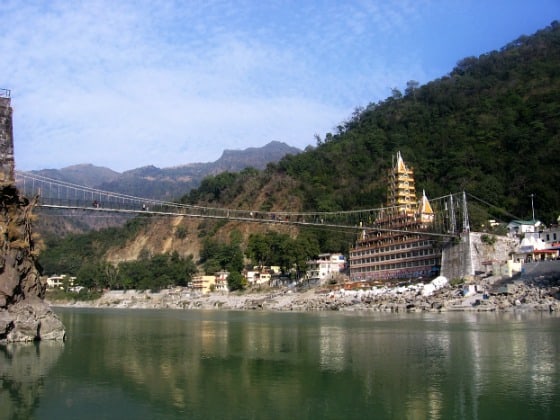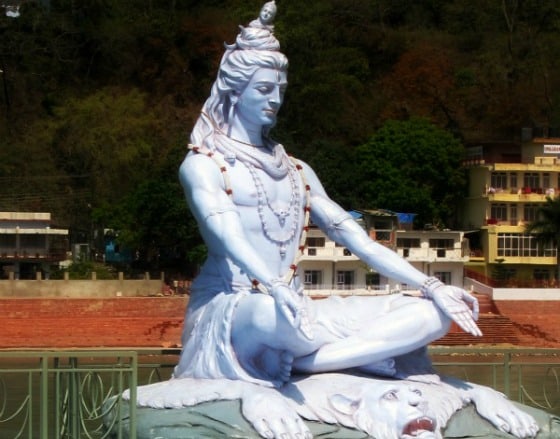Rishikesh, India: Yoga Capital of the world
As an avid India traveller who has covered 14 states in about 14 months of travel (spread over six years), I am often asked, “Where is your favourite place?” I always find it tough to answer as I have a LOT of favourite places. Usually, my answer will depend on my mood. With this series, I am answering the question one favourite place at a time — starting with a small town in north India, scenically located at the spot where the Ganga (Ganges River) spills out of the foothills of the Himalayas and begins her long journey across the plains of India to the Bay of Bengal.
Rishikesh reminds me of Canada. But with holy cows, om symbols and orange-robed sadhus. I love the combination of robust, pristine nature — fresh mountain air, sunrise over the peaks, a torrential river — and the signs and symbols of a sacred India town. Temple bells ring incessantly, incense wafts on the breeze and yogis are everywhere to be seen.
There is a feeling in Rishikesh unlike anywhere else. The vibe is both relaxed and reverent — and consequently attracts genuine Hindu devotees and gurus as well as western hippies and spiritual dilettantes.
While some may ascribe the increasing popularity of Rishikesh to the booming worldwide interest in yoga, in fact people have been gathering at this confluence of nature since the dawn of time to pray, meditate, chant and imbue the peaceful valley with eons of sacred energy. It’s a deceptively powerful place.
My favourite spot in Rishiskesh is at the quiet north end, where the sea-green river spills out of the mountains. White sand beaches line the banks, an occasional cow wanders by, and locals, yoga students and hippies gather in small groups to bathe in the chilly, fresh water of India’s most sacred river.
Just below is the first of two great pedestrian bridges that span the mighty river. Lakshman Jhula is the smaller bridge, but still it teems with foot traffic, scooters and monkeys. Cafes on both sides overlook the river and one of the most scenic spots in town. From here, Rishikesh wends its way along both banks of the river, at the bottom of a narrow valley. The east side is almost free of car traffic, and a walk from end to end takes about an hour, and passes sadhu huts, parks, and scores of small shops and stalls selling cotton clothes, gems, spiritual souvenirs, Hindu religious icons and snacks.
A peaceful vibe and fresh air
By the time you get to the other bridge, the big one, Ram Jhula, you are in the thick of the busiest part of Rishikesh. Bustling restaurants, busy temples and statues depicting scenes from Hindu epics and the Bhagavad Gita abound.
It is at this end, near the huge Parmath Niketan ashram, where the nightly aarti (spiritual ritual) takes place at dusk on the ghats (steps), in front of a massive white statute of Shiva in meditation pose. It is an exciting event to take part in: pandits chant and wave oil lamps as the sun sets, and after dark everyone is invited to release small offerings — little “boats” made of flowers and leaves, containing a candle and incense stick — on the strong currents of the black river.
You can stay in an ashram and study yoga or stay in a hotel or guesthouse and simply wander the town and the surrounding mountains, enjoying the peaceful vibe and fresh air. All of the food is vegetarian, as Rishikesh is a sacred city, and the shopping is surprisingly good. Best bets are flowing clothes, devotional music, semi-precious gemstone jewelry and books. There are also lots of options for healing treatments, such as Ayurvedic massage, and courses in everything from astrology to sitar.
Rishikesh is the kind of place that some people end up staying in for long stretches of time, and others return to again and again. And then there are those who really never leave, at least not in spirit.
I often think of Rishikesh, of the green river singing as it tumbles and surges through town; of the wind that howls from the abode of Shiva at dawn; of practising yoga in the morning and going for long, contented walks in the afternoon. I have many fond memories of Rishikesh, of friends and teachers and peaceful moments. It is one of those places I retreat to in my imagination when I need solace. Perhaps I have fully integrated Rishikesh, perhaps I never need to return. But I hope I do.

Mariellen Ward is a freelance travel writer whose personal style is informed by a background in journalism, a dedication to yoga and a passion for sharing the beauty of India’s culture and wisdom with the world. She has traveled for about a year altogether in India and publishes an India travel blog, Breathedreamgo.com. Mariellen also writes for magazines and newspapers.











